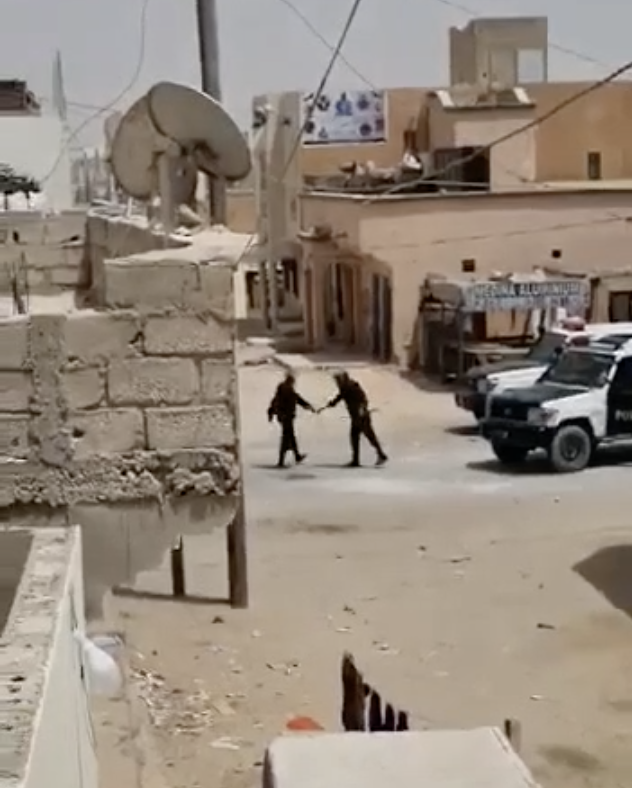Washington – Today, brave Mauritanian leaders were joined by activists and allies in a webinar to expose the truth about the government-led violence against Black Mauritanians. The list of latest abuses includes: imprisoning human rights leaders; murdering a young man who planned to seek asylum in the US; killing another who protested his murder; and kidnapping and torturing young people and protesters around the country.
[content warning – violence, racism, graphic images and videos]
Watch the video; read the transcript; and check out this new backgrounder and timeline.
As graphic videos of the state violence traveled through social media, the Mauritanian government closed its borders and shut down the internet to try to quell the movement. But brave leaders in Mauritania and around the world continue to speak up.
In a webinar today, Amadou Dia of the Mauritanian Network for Human Rights in US talked about the police murders of Oumar Diop and Mohamed Lemine in May, and Souvi, a human rights activist killed earlier this year. Diop and Souvi were electrocuted to death. Diop was a victim of police extortion before being murdered; he had intended to seek asylum in the US. Lemine was shot during a protest about Diop’s murder. The government has staged cover ups and refused autopsies. Read the full transcript of the webinar and this backgrounder for more information and videos.
Dia said: ”One of the reasons why so many people are leaving Mauritania is because the government has been trying to extinguish its Black citizens for decades—from the genocide of the late eighties and the nineties to racial discrimination, slavery, land grabbing, denying citizenship, erasing their languages from official business, and many other matters that affect daily life. And now the choice most of these young Black kids are facing is whether to stay at home and suffer persecution, or make these dangerous journeys.
“And if they leave, they are mistreated and robbed by Mexican authorities on the way. In the US, the Mauritanian community is stepping up to welcome and house people. But they need access to legal resources in order to apply for asylum. We are pleading with the US government to provide TPS for Mauritania.”
Abdoulaye Sow with the Mauritanian Network for Human Rights said: “The Mauritanian government is an apartheid regime that has no respect for human rights. And this is not new. It has been going on for decades. But what is happening right now in Mauritania, especially in this last week, is just telling us that they’re not backing down. So we’re calling on the United States, the United Nations, and the African Union to act. We cannot allow this to keep happening. We have to address the real issues. Black Mauritanians are part of this country’s history. The Mauritanian government has to respect our human rights. And the US must not send people back to a country where government has no respect for human dignity.”
Said Aita Wellington with Communities United For Status and Protection (CUSP): “Families in Mauritania are at risk. Those who are in the United States are at risk. And that’s why we are calling on the U.S. government to protect them. We know it’s possible. We’ve seen it happen when there were other times to take quick action. We’ve seen it with Ukraine, we’ve seen it with Afghanistan, we’ve seen it with multiple countries over the years. We’re on the eve of Juneteenth and we think we are celebrating the end of slavery in the United States, but a country that’s just across the Atlantic from us is still suffering through that.
“TPS is a bridge. It doesn’t preclude you from applying for asylum; you can do both, and clearly Mauritanians have the experiences that warrant both. But the asylum cases are taking years. And people need protection now. So we’re calling on the Biden administration to immediately designate TPS for Mauritania. No one should be sent back to a place that will torture them.”
Haddy Gassama with Undocublack Network added: “All of these horrific videos we are seeing, I have to say, this is not normal. This is not OK. And the good thing is that it does not have to continue. All of us in this room, and all of the folks in our network have the power to stop this and protect people from having to experience this.
“One of the key things that activists and community leaders have named is that there is a direct agenda by the Mauritanian government to hide this information. They’ve gone as far as to shut down the internet so these horrific videos and images don’t get disseminated. I want to be extra clear that the examples that were named here—whether its police brutality, literal murder, land grabbing, erasure of languages—these are all very key components of ethnic cleansing. And that is what is happening in Mauritania today. If you look at the legal standard under international law for what ethnic cleansing is and looks like and how it starts, the examples we’ve heard today fit that. And one of the things that we say in the States or in any kind of human rights/immigrant rights movement, when atrocities happen, it’s this constant notion of ‘never again.’ Right? This is our opportunity for that. Never again. And for Mauritania, quite frankly, it’s been going on for far too long.”
Lynn Tramonte with the Ohio Immigrant Alliance said: “The demands set out by Black Mauritanian leaders in the diaspora are simple: don’t accept the Mauritanian government’s gaslighting. Look at these videos. See what is going on. And then act. Mauritania needs international pressure and accountability to end the apartheid. The US needs to ensure safe migration pathways, complete access to asylum, and Temporary Protected Status as an immediate step.
“Oumar Diop was about to seek asylum in the United States when he got killed by the police, and then began the government cover-up. That proves his asylum claim right there. The United States government, from the State Department to the Department of Homeland Security, to the White House has the power. It needs to act.”
Watch a video of today’s webinar (rushed transcript also available). Check out this new backgrounder and timeline about the latest atrocities in Mauritania.
###

